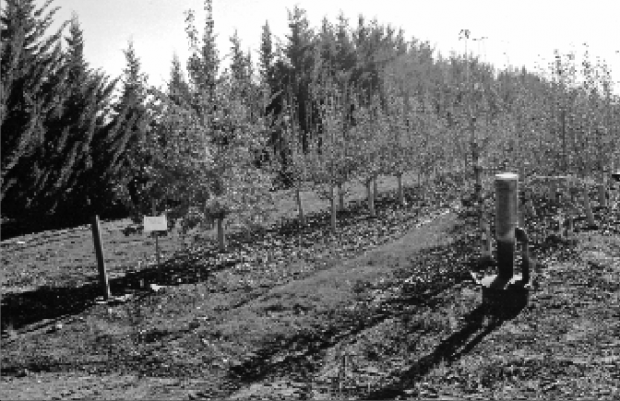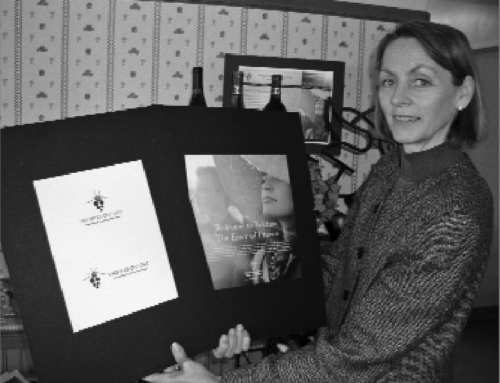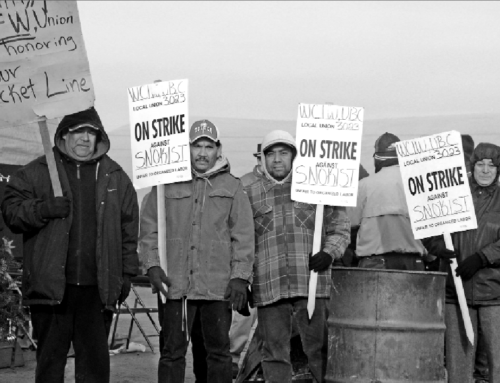
(John Schmitz/Good Fruit Grower)
One of the most famous names in the mail order business today owes its existence to the world’s greatest financial disaster. The story goes something like this: Medford orchardists Harry and David Holmes, unable to sell their fruit to a nation racked by the Great Depression, took some of their choicest Bear Creek Orchards Comice pears to New York in the early 1930s. There, upon the suggestion of an advertising agency copywriter, they sent boxes of the pears to the captains of industry, along with a sales letter.
Within a day, orders began pouring in and the power of mail order was etched forever on the Holmes brothers’ minds. “People were just blown away with the quality,” said Scott Cully, director of west (Rogue River) valley orchard operations for Bear Creek Orchards, Inc., a division of Bear Creek Corporation. Cully added that the Holmes brothers learned another valuable lesson that winter in New York, one that has taken the company to where it is today: Only pack your very best fruit, and charge handsomely for it.
People will pay the price. Seventy years later, Bear Creek Corporation has developed into a $500 million, vertically integrated company best known for its Harry and David mail order division that has around one-tenth of the U.S. population on its mailing list. Harry and David’s gift pack line includes hundreds of products—everything from fruits and vegetables, much of which is outsourced, to Moose Munch caramel corn, tabletop Christmas trees, and even the Middle Eastern delicacy baklava. The company also has its own mail-order rose, bulb, and perennial plant division, Jackson and Perkins, which is headquartered in California.
Millions of Customers
Millions of customers Cully, who often doubles as tour guide, points out to visitors that Bear Creek Orchards is just the opposite of most agricultural operations, which have very few but large customers. “We have millions of customers, but they’re small. When you think about Bear Creek, you have to think about marketing first, not agriculture. That’s the key. We sell entertainment, the ‘wow’ factor. We sell pleasure. Our farm is a tiny, tiny piece of this.” What’s more, Cully added, Bear Creek is deeply integrated. “We do everything from the ground up, right to the customer’s door.” Just one of its three call centers alone, a 35,000-square-foot facility in Medford, has more than 600 cubicles manned 24 hours a day, 7 days a week during peak ordering periods. So heavy is the volume at times that the company employs dozens of floaters just to relieve people who go on break. During the holiday season, all three call centers average 90,000 calls a day.
Comice the centerpiece
Comice, the centerpiece The centerpiece of Bear Creek Orchard’s operation is and always has been the Comice pear, more specifically its proprietary Royal Riviera variety. In fact, the company is the largest grower of the variety in the world. Bear Creek also grows 100 acres of Bosc pears and 100 acres of seven varieties of peaches in Medford. Why would the Holmes brothers choose to stake their livelihood on such a low-yielding, temperamental, fragile variety?
Because they believed it was the best-tasting pear in the world, said Cully. “It’s a variety that’s so hard to grow, so hard to handle, so hard to ship that you’d think we’d be out of our minds…until you taste them.” Comice pear trees grown in the company’s Medford orchards yield about half of what other varieties do, Cully said, and only a fraction of the fruit actually ends up in colorful Harry and David gift boxes. “Once harvest time comes around, because the skin is so delicate and the stem doesn’t bend, half of what you pick is going to be worthless. That’s why people don’t grow Comice pears.” Bear Creek manages around 3,300 acres planted mostly to Comice in the rugged Rogue Valley from Medford to Ashland. One of the biggest challenges to growing fruit in the Rogue River Valley is hail, Cully said.
Here, the company is experimenting with fine netting that protects pears. Bear Creek buds most of its own trees on bare root, semidwarfing Quince rootstock raised in the Willamette Valley using the layering method. Bud material, which comes from mother blocks in Medford, and the rootstocks are joined at the company’s Jackson and Perkins facility in California. The average planting density is 444 trees per acre on 7-foot by 14-foot spacings, with some orchards as high as 800 trees per acre.
Frost control is provided by various methods, including smudge pots, propane burners, overhead sprinklers, and 50-foot-tall wind machines. All water comes from snowmelt from the nearby coast range to the west and the Cascades to the east. The water is delivered to orchards by a series of canals. “The Rogue Valley has no major aquifers,” said Cully. Water is applied to trees primarily by micro sprinklers, with the majority of the remainder of the acreage under overhead sprinklers. Each one of Bear Creek’s 750,000 trees is hand pruned every year. “We expect employees to prune at a rate of 12 trees per hour,” Cully said. Bear Creek rents up to 1,700 hives of bees a year from California beekeepers.
Packaging
When pears come into the packing facility from cold storage, which is maintained between 32 and 33°F, they are handled very carefully. Because the stem of a Comice is so stiff, they are transported in a water cushion bath that prevents them from puncturing one another. The water bath also prevents bruising. To assure that they meet the exact sweetness standard Harry and David is looking for, sugar levels are checked from the field to the packing house.
Pears that don’t pass cosmetic muster are trucked to Sabroso Company, a nearby processor that makes them into a purée. So that they can survive the rigors of shipping, pears going into gift boxes are individually wrapped in tissue and packed in foam cells. “Every one has to be handled like that, otherwise they’re mush,” Cully said. While the pears are sold primarily through the catalogue and at Harry & David’s over 100 retail outlets around the country, the peaches, which are more fragile, end up only in gift packs under the trade name Oregold.
—by John Schmitz, Salem Oregon



I have a Frosty the Snowman Christmas decoration that came from Harry and David at Bear Creek Orchards, out Medford Oregon way. My great aunt, Ella Prusnak, ordered and received it in December 1951. She passed it on to me a long time ago. I was curious to know if you have any history on this item. It is approximately 11″ high, made out of cardboard of some kind, was painted white with a black top hat, and it used to have a scarf and broom (both of which have long since disappeared).
I have a Bear Creek box
Says” mountain Bartlett” on it
I have a basket that says…Hand Woven and Packed by Harry and David at Bear Creek Orchards , Medford, Oregon.
I was glad to read the history!
I have a label mounted on a piece of wood with bear. Holmes Bear Creek extra fancy so on…
J’ai travaillé comme stagiaire pendant un an, en 1961, á Bear Creek Orchard. Magnifiques souvenirs, mon entourage très symphatique. Merci à Mr et Mme Glenn Harrison.